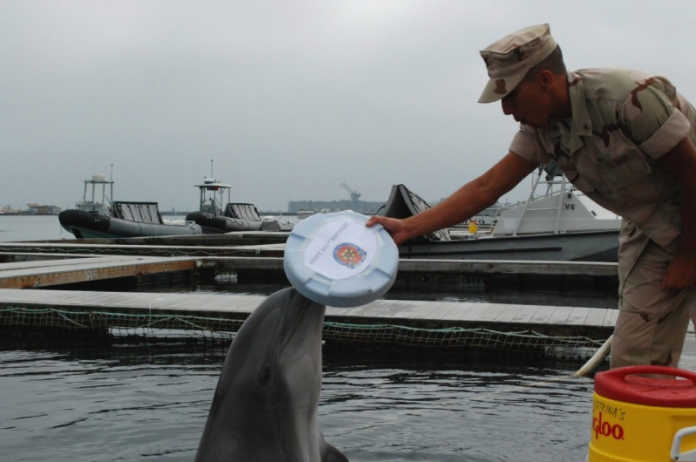
Surprise raids on Mexican smuggling boats, international treaties, and outright fishing bans have done little to stop the steady decline of the vaquita, the world’s smallest and possibly cutest porpoise.
Now, in a last-ditch effort straight out of a Sea World-themed sci-fi movie, conservationists are turning to a new method of vaquita preservation: military dolphins.
Technically, they’re the Seal Team 6 of dolphins, specially trained by the U.S. Navy to detect undersea mines and such.
Navy officials hope they’ll be equally good at finding the last vestiges of the vaquita, which make their home in the warm waters between the Mexican mainland and the Baja California Peninsula and have been decimated by a cruel mixture of fishing nets and economics.
“Their specific task is to locate” vaquitas, Jim Fallin of U.S. Navy Space and Naval Warfare Systems Center Pacific told the Associated Press. “They would signal that by surfacing and returning to the boat from which they were launched.”
If the plan is approved, it would be the first step in a risky relocation project that may be the vaquita’s only chance to survive the next decade.
Vaquita numbers have dwindled since a fishing boom around World War II for a species of sea bass called totoaba, according to The Post’s Darryl Fears. In China, where the totoaba bladder is both a delicacy and a traditional medicine, a pair of bladders can fetch $8,500.
To catch totoaba, which are also endangered, fishermen drag mesh gill nets through the warm waters of the Pacific, snagging everything they come in contact with – including vaquita.
Trapped in the nets, the porpoises drown when they can’t swim to the surface for air.
“It became clear that vaquitas were dying in most, if not all, types of gill nets used in the northern Gulf,” wrote the Cetacean Specialist Group, which tracks the porpoises.
Mexico has long had laws to protect vaquita, and the government is pressuring fishermen to use nets that vaquita could swim out of if caught. But by the time all fishermen have the new nets, the vaquita may already be extinct.
In September, the Convention on International Trade in Endangered Species urged Mexico, the United States and China to do a better job of sharing information on totoaba busts and seizures to catch more criminals and better protect the endangered porpoise, The Post reported.
But the Gulf of California is full of impoverished fishermen who see totoaba bladders as a way to provide for their families.
The economics don’t bode well for the vaquita.
In 2014, a survey found only 100 vaquita, half the number reported two years earlier.
Last year, a count found just 60, and scientists worried that the battle to save the vaquita was all but over, Fears wrote.
The Navy’s dolphins would help locate them. Then, an international team of experts would capture them and transport them to a special holding facility, safe from the trawling nets of fishing boats, according to the AP.
But the plan has potential holes.
For one, vaquita have never been found to survive or thrive in captivity. They’re elusive and hard to find and haven’t been thoroughly studied.
And the “little cows” aren’t exactly the rabbits of the sea.
They reproduce slowly – a mature female has about one calf every other year.
If the few remaining females die in captivity, for example, the species would be doomed.
Featured Image: Lt. David Bennett/Navy
(c) 2017, The Washington Post

